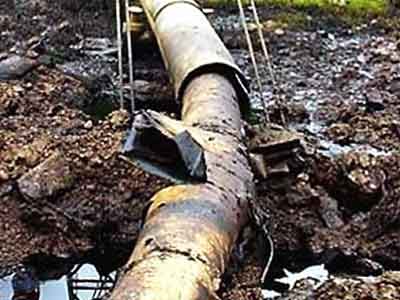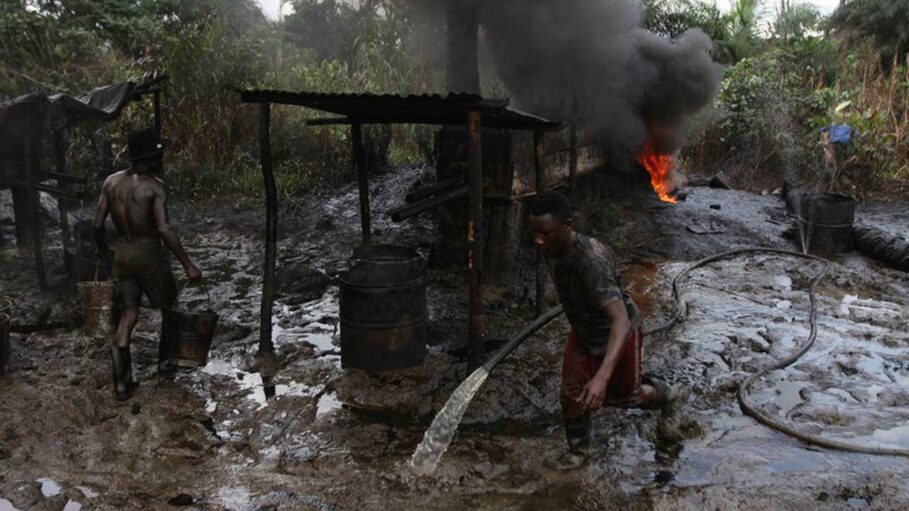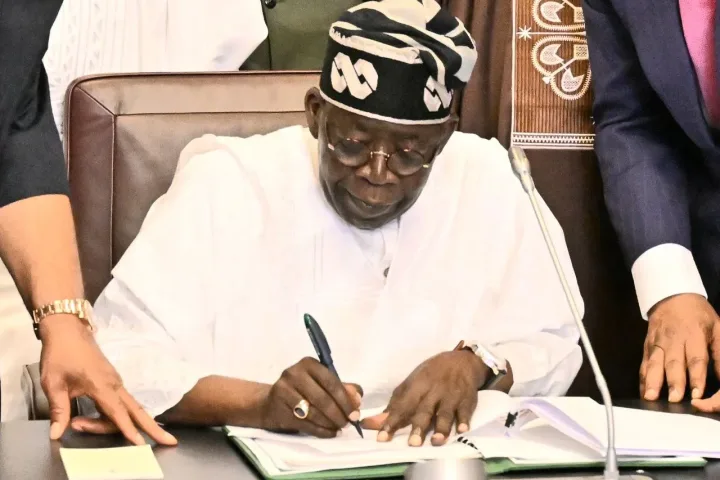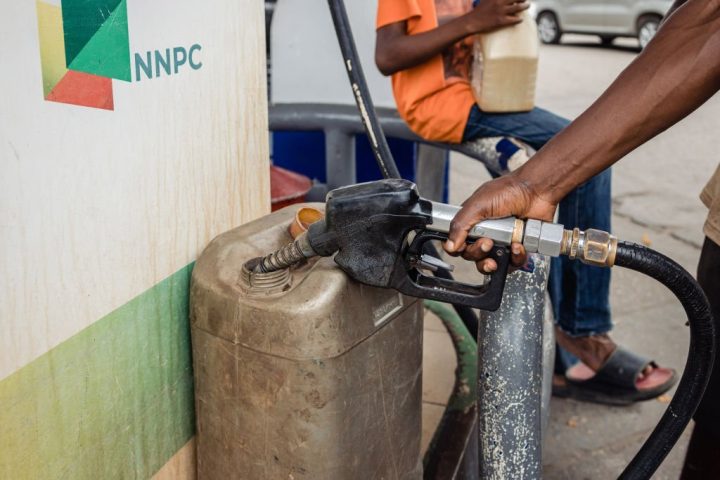Increasing crude oil production output which provides over 90 per cent of Nigeria’s revenue has continued to elude the country due to theft.
Oil theft in Nigeria has been a long-standing issue, with billions of dollars worth of crude oil stolen from pipelines and infrastructure every year. The theft, often carried out by criminal syndicates, has devastating effects on the country’s economy and environment.
Join our WhatsApp ChannelIn the latest update on Tuesday, the Nigeria National Petroleum Company Limited (NNPC) said a total of 226 incidents of crude oil theft were recorded in Niger Delta between 18 and 24 November 2023. The national oil company said 39 illegal pipeline connections and 77 illegal refineries were uncovered and destroyed in the region which includes the following states, Rivers, Delta, Abia, Bayelsa, and Imo in the past week.
It also added that 21 cases of oil pipeline vandalism were recorded in Delta and Rivers State where a boat fills with crude from a vandalised wellhead. Five cases of oil spills were also recorded in the past week while illegal storage sites were discovered in Rivers, Delta, Abia and Bayelsa States.
“Pipeline vandalism remained a persistent challenge, with 21 incidents detected in Rivers and Delta states. Security forces also intercepted nine vessels engaged in AIS (Automatic Identification System) infractions and apprehended 55 wooden boats transporting stolen crude in Delta State.”
Last week the Chief Executive Officer, NNPCL, Mele Kyari had during the weekly series tagged “Energy and You” aired on NTA, revealed that over 5,000 kilometers of oil pipelines were destroyed by vandals, with the country recording 172 crude oil theft incidents across different states between 11th to 17th of November.
The stolen oil is often sold on the black market, with some of it being taken to small-scale refineries within the country (known as ‘kpoo fire’ operations), while the rest is smuggled out and sold to international buyers.
The Nigerian government has struggled to effectively combat oil theft, as it is a complex and widespread problem that involves corruption, collusion with local communities, and the use of sophisticated technology.
The war against theft which has denied the country a huge chunk of oil revenue continues with strong collaboration among security agencies, as observers have said.
Efforts to combat oil theft in Nigeria have included increased surveillance and security measures around oil infrastructure, as well as engaging with local communities to address the underlying socioeconomic factors that drive people to participate in oil theft.
At the inception of his administration, President Bola Tinubu renewed the pipeline protection contract awarded to Tantita Security Services Limited for another three years. The private security company allegedly owned by ex-militant leader, Chief Government Ekpemepulo popularly known as Tompolo was awarded a N48 billion pipeline surveillance contract across the delta region by the Muhammadu Buhari administration.
Some individuals, groups and communities have kicked against the contract, however, the Federal Government insisted on maintaining the contract citing improvement in security around oil pipeline facilities. Recently, the Rivers State Governor, Siminalayi Fubara, spoke against the deal saying it was wrong to award such a contract to ‘one man’. While saying that it would not be good to hand over such national assets to one person, the governor suggested that key stakeholders from various communities where pipelines passed through should be involved in the surveillance contract.
Also, the commander of the Niger Delta People’s Volunteer Force, Asari Dokubo, had in September 2022, fumed at the deal, saying it doesn’t sound good that only Tompolo is in charge of the surveillance contract which also cut across even his Kalabari area in Rivers State.
In June 2023, Dokubo had while saying that the Nigerian military have all it takes to combat insecurity across the country, accused it of participating in oil theft. However, the military was quick to deny the allegation.
Oil Revenue Losses
At the Nigeria International Pipeline Technology and Security Conference in Abuja on November 6, the Nigeria Extractive Industries Transparency Initiative (NEITI) revealed that more than N4.3 trillion worth of crude oil was stolen in 7,143 pipeline vandalism cases within a period of five years in the country.
The Executive Secretary of NEITI, Ogbonnaya Orji, who made a presentation at the conference organised by the Pipeline Professionals Association of Nigeria, said that oil theft and attendant losses had become a national emergency.
Reeling out data to back up his claim, Orji said: “NEITI disclosed that in the last five years, 2017 to 2021, Nigeria recorded 7,143 cases of pipeline breakages and deliberate vandalism resulting in crude theft and product losses of 208.639 million barrels valued at $12.74 million or N4.325 trillion.
“NEITI reports also disclosed that during the same period, Nigeria spent N471.493 billion to either repair or maintain pipelines.”
He noted that “the country is yet to derive optimal benefits from its oil and gas resources due to oil theft and losses through pipeline vandalism, pipeline integrity compromise, outright sabotage, and general insecurity in the region.
“From NEITI’s reports over the years, and recent insights from our membership of the Special Investigative Panel on Oil Theft and Losses, we are aware that oil theft is perpetrated mainly through pipeline clamping, illegal connections on major pipelines, exploitation of abandoned oil wellheads, pipeline breakages and vandalism of key national assets to illegally siphon crude into waiting vessels stationed in strategic terminals.
“These criminal exploits take place most times in atmosphere of communities’ complicity and conspiracy of silence.”
He further indicated that NEITI record of oil theft and losses revealed 619.7 million barrels of crude, valued at $46.16 billion or N16.25 trillion between 2009 and 2020.
“In addition, Nigeria lost 4.2 billion litres of petroleum products from refineries, valued at $1.84 billion at the rate of 140,000 barrels per day, from 2009 to 2018.
“Thus, the total value of crude losses between 2009 and 2020 is higher than the size of the country’s foreign reserves and almost 10 times Nigeria’s oil savings in Excess Crude Account,” Orji stated.
Meanwhile, at an interactive session with the Senate Committee on Petroleum (Downstream), the NNPCL CEO lamented that the problem of oil theft in the country had been on for decades, adding that the company had not been able to pump oil through the pipeline from Warri to Benin within the last 22 years.
“Over 5,000 kilometers of oil pipelines in the country are not working. As a result of pipeline vandalism, 10 million litres of oil was lost from the volume pumped from Aba to Enugu at a time,” Kyari said.
“The company has been unable to pump oil from Warri to Benin within the last 22 years and cannot connect to Ore. There is no amount of security measures that had not been taken to curb the crime without success, which to us in NNPCL, is substantially a national calamity.”

The country has continued to record low output in crude oil production for years now and is unable to meet the quota allotted by the Organisation of Petroleum Exporting Countries (OPEC), which is said to be hugely responsible for oil revenue losses, especially during high prices in the international market.
Nigeria’s crude oil output rose to an all-time high of 1.35 million barrels per day in September 2023, as the country pumped its highest volume of crude oil so far since this year. However, this is still below the OPEC quota of 1.74 million barrels per day. Analysis of data released by the Nigeria Upstream Petroleum Regulatory Commission (NUPRC), on the country’s oil outputs shows that not less than N8.7 trillion at N758/$ was lost between January and August because of the country’s inability to meet its quota.
According to the proposed 2024 budget to be presented by President Tinubu at the National Assembly on Wednesday, November 29, 1.8 mpd oil output at $77 per barrel was estimated.
Despite the arduous task of manning the facilities, security efforts is said to have yielded some positive results. NNPC which said it maintains a zero-tolerance policy towards crude oil theft and pipeline vandalism, disclosed that a total of 35 individuals involved in crude oil theft were arrested during the period under review.
“We are committed to working with industry partners and security agencies to combat these illicit activities and safeguard Nigeria’s energy security,” the national oil company avowed.
Also, the military last week announced that it seized over 500,000 litres of stolen crude oil in the Niger Delta region.
Nigeria’s Defense Minister, Bello Matawalle, said the Federal Government plans to increase the country’s oil production level to 1.9 million barrels per day, as it is fully committed to the fight against crude oil theft.
Environmental concerns
In addition to the economic impact, oil theft also leads to significant environmental damage, as the illegal tapping of pipelines often causes oil spills that pollute the land and waterways.
It also poses a serious security threat, as criminal gangs involved in oil theft are often also involved in other illegal activities such as gun-running and kidnapping.
Local illegal refinery operators known as “kpoo fire” have reportedly caused pollution of the environment. Videos circulating in the Internet about illegal oil refining activities, show thick smoke billowing from forests where they are carried out.

Last year, there were reports of soot pollution in parts of Rivers State as a result of kpoo fire operators’ activities.
Soot is a deep black powdery substance consisting largely of amorphous carbon, produced by the incomplete burning of organic matter. There were reported cases of respiratory illnesses suffered by people living in parts of the state linked to soot produced by illegal refineries. Though the soot problem in Rivers State is not new, it has significantly worsened in recent years as carbon particles from the shoddy business of crude oil refining have overtime built up in the atmosphere, with black clouds regularly defacing the environment, buildings, trees, and vehicles covered with the deposits.
READ ALSO: EDITORIAL: Crude Oil Soots Port Harcourt With Death Threats
The state government under the immediate past governor, Nyesom Wike heavily clamped down on illegal oil refining operators to reduce the menace, but the practice still continues.
In August, security operatives from the Joint Task Force, Operation Delta Safe, collaborated with Tantita Security Services to set a vessel carrying 800,000-litre drums of stolen Nigerian crude oil ablaze in the Escravos region of Delta State. This didn’t come as a surprise to analysts who believed it was a facing-saving measure against the accusàtion of collusion in the oil theft business.
On the other hand, many also criticised the action, pointing to the environmental impact and economic implications in terms of the value of the burnt crude and vessels.
Victor Ezeja is a passionate journalist with six years of experience writing on economy, politics and energy. He holds a Masters degree in Mass Communication.



















Follow Us